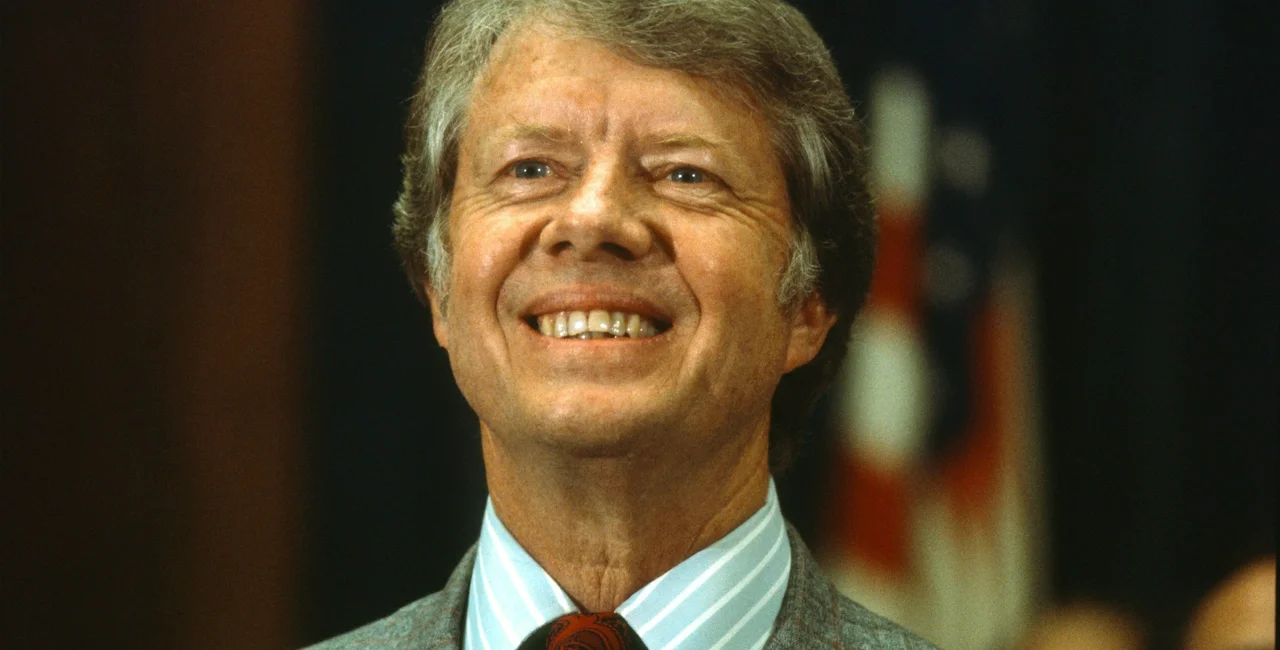Following the passing of former U.S. President Jimmy Carter on Dec. 29 at 100, Czech leaders lauded his legacy as a champion of human rights. But it is Carter’s successor, Ronald Reagan, who is often credited with playing a key role in the fall of communism—reflected by a street in Prague’s Bubeneč district bearing his name.
In the wake of his death, however, historians and analysts are citing the indelible mark Carter left on the Cold War in Central and Eastern Europe. The 2002 Nobel Peace Prize winner’s push for human rights in U.S. foreign policy set the stage for the region’s eventual move toward democracy.
Jan Hornát, an analyst at Charles University's Faculty of Social Sciences, spoke to the Czech News Agency this week about Carter’s lifelong commitment to civil rights and social justice. Hornát pointed to the 1978 Camp David Accords as Carter’s greatest diplomatic achievement, which led to Israel returning the Sinai Peninsula to Egypt and the signing of the 1979 Egyptian-Israeli peace treaty.
“Carter's humility, which Americans still appreciate today, was never ideological, but deeply human,” Hornát said. “He had many opportunities to send U.S. troops into conflicts—like Nicaragua, Afghanistan, or Iran—which could have helped his re-election. But he chose not to. This restraint was rare during the Cold War.”
Trinity Bank economist Lukaš Kovanda notes that Carter's influence also rippled through the world economy, via his deregulation of key sectors, including aviation, which sparked innovation and competition, boosting the U.S. economy.
These reforms writes Kovanda, helped reduce inflation and foster economic growth, strengthening America’s global position and enabling the U.S. to surpass the Soviet Union, contributing to the fall of the Iron Curtain and ultimately laying the foundation for theReagan policies that helped topple the Berlin Wall.

Daniel Fried, writing for The New Atlanticist, also argues that Carter’s achievements in the context of the Cold War are often overshadowed and dismissed as a prelude to Ronald Reagan's leadership. Fried believes that Carter’s focus on values like human rights laid the moral foundation for U.S. efforts to pressure the Soviet Union.
Strained ties with Czechoslovakia during Carter administration
Despite initially strained U.S.-Czechoslovak relations, Carter’s long-term influence became more apparent as his policies set the stage for the region’s democratic movements. From 1977 to 1981, Carter’s administration withheld diplomatic negotiations with Czechoslovakia, citing its government’s loyalty to Moscow and its continued harassment of dissidents.
Additionally, Carter refused to finalize a trade agreement that would have returned gold seized from Czechoslovakia by Nazi troops during World War II, holding progress on the issue hostage to improvements in human rights.

While some dissidents worried this policy might increase their isolation, others, including members of the Charter 77 human rights initiative, respected Carter’s principled stance. Jiří Hájek, former Czechoslovak foreign minister and founding signatory of Charter 77, told the Washington Post in 1978 that while Carter’s policies didn’t immediately improve conditions under communism, they empowered dissidents and subjected oppressive regimes to international scrutiny.
Support for Polish Solidarity
Fried writes that, while previous U.S. administrations accepted Soviet control over the Eastern Bloc, Carter—along with his National Security Advisor Zbigniew Brzezinski—shifted U.S. policy to support dissident movements, including Poland’s Solidarity movement, which attracted nearly 10 million members within a year.
Later, in 1980, alarmed by Solidarity’s growth, the Soviet Union threatened to invade Poland, just as it had done with Czechoslovakia in 1968. At that time, the Lyndon Johnson administration barely reacted due to its focus on Vietnam. This time, however, the Carter administration warned the Soviets against invading Poland.

Human rights as key to foreign policy
In a post on X yesterday, Czech President Petr Pavel described Carter as “a man with a deep commitment to serving the people and building a better future.” At the same time, Foreign Minister Jan Lipavský called him “a true statesman, a defender of human rights, and a voice for peace.”
My heartfelt condolences to the family and loved ones of former President Jimmy Carter. We have lost a man with a profound commitment to serving others and building a better future. His personal dedication and humanity will remain an inspiration forever.
— Petr Pavel (@prezidentpavel) December 30, 2024
Perhaps it was Czech dissident and late President Václav Havel, who met with Carter in Prague in 1993, who paid the greatest tribute to the leader's often underappreciated impact on the Cold War. Havel said that Carter’s emphasis on human rights undermined the Soviet bloc’s “self-confidence”—and inspired him in prison.












 Reading time: 3 minutes
Reading time: 3 minutes 


























